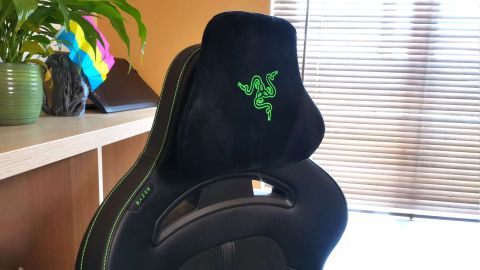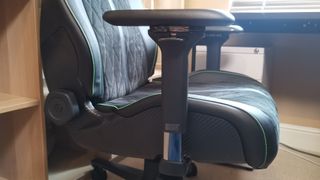Our Verdict
The Razer Enki Pro has plenty of premium appeal with a price tag to match. It's extremely comfortable, well built and will work for most body heights and weights, making it a fantastic addition to luxury gaming setups.
For
- Extremely comfortable for a racing seat
- Magnetic memory foam headrest
- Premium metal construction
Against
- Eye-wateringly expensive
- Not especially rich in features
PC Gamer's got your back
The Razer Enki Pro looks, at least at first glance, like many of the near-identical racer-seat style gaming chairs on the market. Though thankfully, appearances can be deceiving. Racing-style chairs have gained a tragic reputation in recent years for focusing too much on aesthetic and too little on actual comfort, which makes buying a gaming chair difficult if you want something that will properly support your back and buttocks and look the part to match your gaming setup.
This is where the Razer Enki Pro is going to thrive. It has all of the edgy stylings of a racing seat (with a healthy splattering of vibrant green stitching and the iconic Razer logo), but it actually makes good on the promise of a premium design…for a price.
If you want to buy the Razer Enki Pro then the good news is that, like many Razer products, it has great worldwide availability including most of the US, Canada, Europe and Australia (though be sure to check on the official Razer website). The bad news is, this premium piece of furniture will set you back $999/£999.
That's a whole $600 more expensive than the base model Razer Enki ($399 / £349), not to mention over twice the price of the Secretlab Titan Evo 2022 ($449 / £379) which is currently sitting pretty at the top of our list for the best gaming chairs on the market.
If you've ever previously owned a gaming chair then it will be immediately apparent you do get a few luxuries with the Razer Enki Pro, even from the assembly. The chair arrives well protected within its packaging, and is mostly pre-assembled—you simply need to push in the castor wheels, pop the seat onto the base itself, and then attach the backrest using eight screws.
You even get a fancy Razer-branded glove to wear while you put everything together to avoid leaving fingerprints on anything. Though this feels entirely performative.
Once assembled it's clear where the Razer Enki Pro differs from the mainstream competition. Instead of the usual plastic paddles and buttons you get to control the position of the armrests, you're getting solid metal with a beautiful glossy black finish, and it gives some additional weight to the motion when making adjustments. The armrests are described as 4D so they can be moved up and down, forwards and backward, and side-to-side, though the rests themselves can’t be rotated.


It's genuinely the most comfortable racing-style gaming chair I've ever sat in.
There are a few criticisms though—the armrests have a little bit too much wiggle in them for my liking, especially considering this chair can cost as much as a full gaming PC. So, it would have been nice to see some rigidity, as well as better padding. The soft foam covering is alright, but it doesn’t quite hit the same level of luxury as the rest of the chair itself.
Speaking of which, the design for the seat really is beautiful. The Razer Enki Pro uses a mix of Alcantara (a synthetic leather) and a faux-suede material with diamond-patterned stitching. That almost gives it the look of a fancy armchair, and while we’ve only had the seat for a short time, it does feel higher-quality than the usual materials found on gaming chairs which should help with longevity.
The recommended height and weight limit of up to 6ft 6in (204cm) and 299lbs (136kg) is on the more generous end of a gaming chair, and smaller individuals can enjoy it too—I measure in at a very chunky 5ft 6in, and while the chair feels more like a throne, it didn’t feel too large to enjoy benefits such as the lumbar support and headrest. Still, if you are on the extreme larger or smaller side for both height and weight, you might want to look for a more specialist option. Secretlab splits its chairs into height and weight categories, which could make them a more suitable fit for your body type if you have concerns.
The Razer seat has plenty of high-density foam padding which didn’t deflate and kept its shape nicely after frankly embarrassing durations spent sitting and, while you don’t get a separate lumbar pillow, there is some lumbar support built into the backrest of the chair. It's slightly disappointing that this can’t be adjusted with a dial to personalized the level of support (and it's important to note that Razer is careful not to market this chair as being ergonomic) but it's still genuinely the most comfortable racing-style gaming chair I've ever sat in.


The recognizable 'Razer green' is present throughout the chair; featuring as the main color for all of the stitching as well as on both the headrest and memory foam head pillow. That might put you off if you have a particular color theme already, but hey, some of the appeal for this chair is with the branding.
Speaking of the headrest, this is by far the best example of a magnetic head pillow we’ve seen on a gaming chair to date. It's much stronger than the one found on the Secretlab Titan Evo 2022 and therefore less liable to skip off during use, and its shape also hugs the lower head and provides fantastic support. If you’re not a fan of neck support then you can just remove it, but the backrest is a tad too firm for my liking without it.
The castor wheels and wheelbase are another area where Razer has focused on quality, with plenty of metal for stability and longevity over the majority hard plastic used across some cheap gaming chairs. They work well on both heavy pile carpet and hardwood floors so you’ll have no issues using it across a variety of surfaces. I didn’t detect any wobble from the castors, and its motion was very smooth and responsive.
If you were hoping to use the Razer Enki Pro for the occasional nap then you’ll need to know that it doesn’t have a full 180 degree recline, instead maxing out at a still comfortable 152 degrees. I didn’t fall backwards when testing the limits on this, and it does still feel comfortable if you need to change up your resting position, but if you need to be horizontal for a quick snooze then you’ll need to march yourself off to an actual bed.
The only plastic controls are the dial located on the right of the chair which can be twisted to adjust your sitting position, and two under-seat 'switches' that resemble leaders, which will control the height of the chair on the right-hand side, and fix the backrest in place on the left. While plastic, these still feel well-made and are nicer to look at and operate than controls found on the likes of the Andaseat Kaiser 2.



Its price tag feels frankly unnecessary given how few features and actual ergonomic benefits you get.
Overall, the Razer Enki Pro is a fantastic gaming chair, but its price tag feels frankly unnecessary given how few features and actual ergonomic benefits you get. The Herman Miller x Logitech G Embody collaboration sits at around $1,500 (£1,400), which makes it one of the most expensive gaming chairs on the market. But for that you get the Herman Miller reputation for lumbar support and comfort, which is likely to trump that of the Razer Enki Pro if ergonomics is your main concern , and if you’re happy to buy a non-racing-style chair.
Similarly, the Secretlab Titan Evo 2022 also sports a magnetic headrest pillow, a racing-seat design and a deeper recline for a fraction of the price, and that can be configured in a wide variety of fabrics and designs to match just about any environment. The Razer feels sturdier and overall a higher-quality, but not $600 more so.
Ultimately, this is going to be the deal choice if you need something that sits between the two. The Razer Enki Pro is built like a tank, designed like a luxury sports car seat, and offers butt-hugging, spine-relieving comfort over more affordable offerings and, unlike anything Herman Miller offers, it actually looks like a gaming chair.
Still, for $999/£999 it would have been nice to see a few additional touches like a selection of color options or designs, adjustable lumbar support and sturdier armrests. Heck, even cupholders would have helped to justify what ultimately feels like the typical 'Razer tax'. If you can afford it then you're unlikely to be disappointed, but if you're tight on cash then there are options available for lower budgets with benefits that come close.
The Razer Enki Pro has plenty of premium appeal with a price tag to match. It's extremely comfortable, well built and will work for most body heights and weights, making it a fantastic addition to luxury gaming setups.
Jess was TechRadar's UK-based Computing writer (@Zombie_Wretch on Twitter), where she covered all aspects of Mac and PC hardware, including PC gaming and peripherals. While she loves all areas of computing tech, broadcasting and gaming-related hardware such as webcams, USB microphones, VR headsets and mechanical keyboards are certainly a special interest subject. You can also find her bylines at Creative Bloq and Space.com, and she has previously been interviewed by the BBC as an industry expert. Her educational background is in prosthetics and model-making, which helped to nurture a love of robotics and creative hardware like 3D printers and graphics drawing tablets. She has built numerous desktop computers over the last 10 years for gaming and content creation and only injured herself once. Outside of work, she likes to watch anime and dabble in digital illustration and sculpting. She can often be found playing games of both the Video and Tabletop variety, occasionally streaming to the disappointment of everyone. A conversation of any length will likely result in her trying to convince you to start playing D&D, though she'd settle for an evening of painting miniatures at a push.

Today's Wordle answer for Saturday, November 9

Genshin Impact's missing English voice acting returns in its latest trailer, but players aren't sure if they should celebrate yet

Palworld developer reports Nintendo's suing over 3 Pokémon patents for only $66,000 in damages, but a videogame IP lawyer says fighting the lawsuit could mean 'burning millions of dollars'

